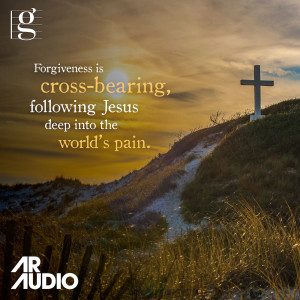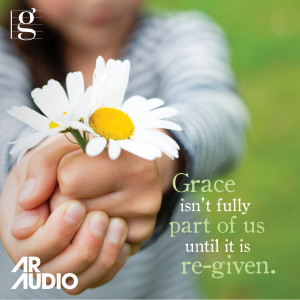Episodes

Thursday Dec 10, 2020
Bill Knott's GraceNotes: Saving Our Stories (December 11, 2020)
Thursday Dec 10, 2020
Thursday Dec 10, 2020
The story brims with contrasts and disparities, and yet we tell it year by year. We meet an emperor, and then, at last, a baby. We hear of wealth, taxation, and deep poverty. We marvel at the gap between an iron power and abject, fragile weakness. The One who roamed the far-flung galaxies created by His word lies helpless in a trough from which farm animals are fed. Brilliant, iridescent angels terrify poor shepherds, who abandon pregnant ewes to gather ‘round the only Lamb who could deliver them. Unlearned and voiceless laborers at the bottom of the ladder are tasked with sharing the first good news the world had heard in centuries. And for all this, the story is ever new and never finished. We know this story—we tell this story—because it is, somehow, the tale of our lives. We know the clash of expectations and realities; of hopes held high and lives lived low; of failures, weakness, joy and pain. And so this birth is like every other birth, and like none that ever has occurred. “What has come into being in Him was life, and the life was the light of all people” (Jn 1:4). Grace came to live with us—to change the ending of our stories. “The light shines in the darkness, and the darkness did not overcome it” (Jn 1:5). So stay in grace. -Bill Knott
Note: If you are blessed by GraceNotes, we invite you to subscribe.

Thursday Dec 03, 2020
Bill Knott's GraceNotes: Grace On The Ground (December 4, 2020)
Thursday Dec 03, 2020
Thursday Dec 03, 2020
The soloist soars high above the massive, harmonizing choir: “O holy night, the stars are brightly shining.” But on that night, no soul on earth expected anything but normal. We drape the story of His birth with yards of gauze and billowy bright angels. We estimate a gentleness His weary parents never knew. We decorate the landscape of our Christmas with smiling sheep and camels trudging from the East. And we forget how hard it is to live beside—among—farm animals in fields or in stables. We ring a halo ‘round a birth that felt—that hurt—like any other birth, for there was nothing to relieve His mother’s pain except, perhaps, the wise words of a midwife and the prayers of worried Joseph. Truth is, the grace of God, the Word made Flesh, took pains to enter all our commonness, our struggle and our dirt, so all who live below the line would see Him as their Saviour, too. Grace never was afraid of dirt—not then, not now, not ever—whether in a musty stable or in a haggard heart. Our pain, our sin, our guilt, our shame—these are the things He gladly wore as surely as those swaddling clothes. He was, He is, Immanuel—God with us; God one of us; God for us. So come, let us adore Him. And stay in grace. -Bill Knott
Note: If you are blessed by GraceNotes, we invite you to subscribe.

Wednesday Nov 25, 2020
Bill Knott's GraceNotes: Full Of Grace And Truth (November 27, 2020)
Wednesday Nov 25, 2020
Wednesday Nov 25, 2020
“If you would tell me, tell me true,” a wise old man once said. “There isn’t time enough for lies.” And when we’ve polished all our trophies, and sung again our victory songs, we come at last to stories too painful to be false. Each honest story unwraps our wounds, our hurts—as well as those we’ve given. We grieve the loved ones whom we’ve lost—a spouse; a friend; a much-loved child—though some of them still live and breathe. We mourn the loss of innocence; we’ve soaked up toxic sums of greed. We laugh at violence and war; we cheer for “heroes” who display our poorest human qualities. We feel the sadness for what’s never fixed or mended or repaired. And so it’s not an accident that we know more of Jesus as a healer than any other role. He stepped into the broken story of our world with grace that made the lepers dance and unlocked tongues that never spoke. He gave the parents back lost children; He cast out evil spirits and refashioned sin-sick attitudes. He told us of a Father who kindly waits for us to finish playing prodigal. And when He died to heal us of our greatest hurt, He took our pain and made it His. “He was wounded for our transgressions, crushed for our iniquities; upon Him was the punishment that made us whole, and by His bruises we are healed” (Isa 53:5-6). The good news is that grace still heals. It closes wounds; it soothes our scars. And someday soon, it leads us home. So stay in grace. -Bill Knott
Note: If you are blessed by GraceNotes, we invite you to subscribe.

Thursday Nov 19, 2020
Bill Knott's GraceNotes: The Choice To Love (November 20, 2020)
Thursday Nov 19, 2020
Thursday Nov 19, 2020
“She was very gracious in accepting my apology,” we say with heartfelt admiration. “He gave a very gracious speech in light of the circumstances,” we add, aware he could have done differently. Our common references to grace reveal we most always link it to “something that didn’t have to be done that way,” or someone who made a noble choice to rise above the normal human lust for power, wealth, or influence. Grace is always a choice, even in difficult, vexing moments. And there we find a useful definition of God’s gracious acts toward us: they are always somethings He was never obligated to do. It was it is—a choice, a principled, character-driven, even painful decision to offer us His love and His forgiveness. Even when we spat on His Son, and beat Him badly, and laughed at His extremity, and mocked Him as He died. If God were not gracious, all who have ever lived would be doomed. “For there is no distinction, since all have sinned and fall short of the glory of God” (Rom 3:23). But grace is real; forgiveness happens, and broken lives are made brand-new. In every hour—on every day—the Father offers the mercy we will neither merit nor deserve. And all for the deep satisfaction He receives of seeing us embraced and welcomed into the kingdom of His Son. So stay in grace. -Bill Knott
Note: If you are blessed by GraceNotes, we invite you to subscribe.

Thursday Nov 12, 2020
Bill Knott's GraceNotes: The Great Unlearning (November 13, 2020)
Thursday Nov 12, 2020
Thursday Nov 12, 2020
We crouch behind our walls and fences, readying ourselves for what we’ve learned to fear. We lock all doors, secure the bars. We mentally rehearse our steps, our routes. We twitch at unfamiliar sounds, lie wide awake when branches scrape the roof, and wait for light and morning. Whoever is not us is “other”—a nameless, faceless “stranger” we assume means only harm. “They” are the people unlike us—of different race, perhaps; or language, habits, customs, faiths. We crave the time machine that takes us back to comfort as we knew it. But grace is so remarkably persistent that even locks and fears cannot deter how it reshapes our thinking. When you discover—at long last—that you were “other” to the Lord—that you were threatening to His kingdom, a rebel to His law and rule, and damaging the world with your hostility and hate. And still He loved—still welcomed you into His house, and gave you keys to all the property. He trusted you before you knew you could be trusted; offered you forgiveness—yes—for sins not yet repented of. We were embraced before we even tried to love. “God proves His love for us in that while we still were sinners Christ died for us” (Rom 5:18). So grace remakes our way of seeing those we used to fear—takes down our walls brick after brick—until we learn that difference is a source of joy, that “other” can be “brother,” “sister” “neighbor,” “friend.” The great unlearning has begun. Now stay in grace. -Bill Knott
Note: If you are blessed by GraceNotes, we invite you to subscribe.

Monday Nov 09, 2020
Journeys With Jesus: The Empty Vase
Monday Nov 09, 2020
Monday Nov 09, 2020
"Journeys with Jesus" is an intimate, personal look at the walk we all have with our Savior. Inspirational, heart-tugging, thought-provoking vignettes of life's journey and life's decisions. Most of all, it points us to our Father, our Friend, as the Source of all wisdom, comfort, and peace. Jill Morikone is the vice president and chief operations officer for Three Angels Broadcasting Network. She and her husband, Greg, live in Illinois and enjoy ministering together. www.adventistreview.org

Monday Nov 09, 2020
Searching The Obvious: Keep Walking
Monday Nov 09, 2020
Monday Nov 09, 2020
Where can I go from your spirit? Or where can I flee from your presence?”(Psalm 139:7, NRSV) “Searching the Obvious” focuses on how the Holy Spirit is ever active in our surroundings and in our lives, urging us to serve others. Personal stories challenge the reader to be mindful of our Christian Walk, recognize our own fallibility and slow down to ‘search the obvious’, the active presence of the Holy Spirit ever always around us. Dixil Rodriguez is a hospital chaplain, serving in southern California. www.adventistreview.org

Thursday Nov 05, 2020
Bill Knott's GraceNotes: Beyond The Galaxy (November 6, 2020)
Thursday Nov 05, 2020
Thursday Nov 05, 2020
If there’s a mountain anywhere to climb, we scale it. If there’s a chasm some say can’t be spanned, we find a way to bridge it. When we demand a new frontier, we harness all the ingenuity we have to launch deep probes of planets, moons and suns. But there’s one goal we’ll never rise to conquer—how to reconcile a sinner to the Father. Nothing in our repertoire responds to this persistent challenge. Effort will not make it happen; wisdom won’t achieve the goal. Diligence and ritual won’t bring the heavens closer. Only from the heart of God could answers come that heal the world, atone for our disaster and disgrace, and offer us a future far beyond the galaxy. Only He who came from God to walk with us, and feel our pain, and mend our brokenness can do the hardest thing that ever was. “And the Word became flesh and dwelt among us, and we beheld His glory, the glory as of the only begotten of the Father, full of grace and truth” (Jn 1:14). Grace came down, and grace abides. And only grace will lead us home. Rejoice in love’s magnificent reality. And stay in grace. -Bill Knott
Note: If you are blessed by GraceNotes, we invite you to subscribe.

Thursday Oct 29, 2020
Bill Knott's GraceNotes: The Best Kind Of Graffiti (October 30, 2020)
Thursday Oct 29, 2020
Thursday Oct 29, 2020
“John 3:16,” the hand-lettered poster reads, and we imagine some sharp zealot who bought a stadium endzone seat to get his message out to millions on TV. “John 3:16,” the spattered license plate declares, as we idle in traffic and ponder why some driver would request those letters and those numbers for his car. “John 3:16,” the understated business card asserts, as we turn over all the notes and papers of our day. These characters—four letters and two numbers—spell out the code of grace. They stand for truths so grand and baffling that we need everyday reminders: “For God so loved the world that He gave His only Son, that whoever believes in Him should not perish but have eternal life.” (John 3:16). God loves us unimaginably. God gave us Jesus unhesitatingly. God welcomes us unendingly. Grace is the boldest, most audacious thing this broken world has ever heard—so startling we are stark amazed that it could possibly be true. It’s not the fate that we expected. It’s not the verdict we deserved. But it’s the gift that God’s deep heart of love still offers us—on any day, in any place. So paint it somewhere on the walls of your life. And stay in grace. -Bill Knott
Note: If you are blessed by GraceNotes, we invite you to subscribe.

Thursday Oct 22, 2020
Bill Knott's GraceNotes: The Gift That Keeps On Giving (October 23, 2020)
Thursday Oct 22, 2020
Thursday Oct 22, 2020
There’s nothing quite as satisfying—or as dangerous—as the certainty that we are right and someone else is wrong. We relish those rare moments of rightness because they wrap us in an unaccustomed virtue, as though we suddenly were several inches taller. Should we be sharp in underlining their mistake, or should we play it cool—and let embarrassment be the bitter aftertaste for those who got it wrong? We toy with power as cats abuse their mice. But there’s another, better way to be both right and righteous. “Above all, love each other deeply,” the Bible says, “because love covers over a multitude of sins” (1 Peter 4:8). The grace that blotted out our sins—that made us whole—is grace available to give when others fail. In fact, we show our gratitude for grace by offering it to those who have no place to hide, who wither in the judgment of their peers. Grace isn’t fully part of us until it is re-given. We learn much more of mercy when we’re merciful to those—like us—who don’t deserve forgiveness. “Freely you have received; freely give,” Jesus says (Matt 10:8). And in the giving, we discover our true size as sinners wrapped in grace. Regift the grace that’s given you. And stay in it. -Bill Knott
Note: If you are blessed by GraceNotes, we invite you to subscribe.

